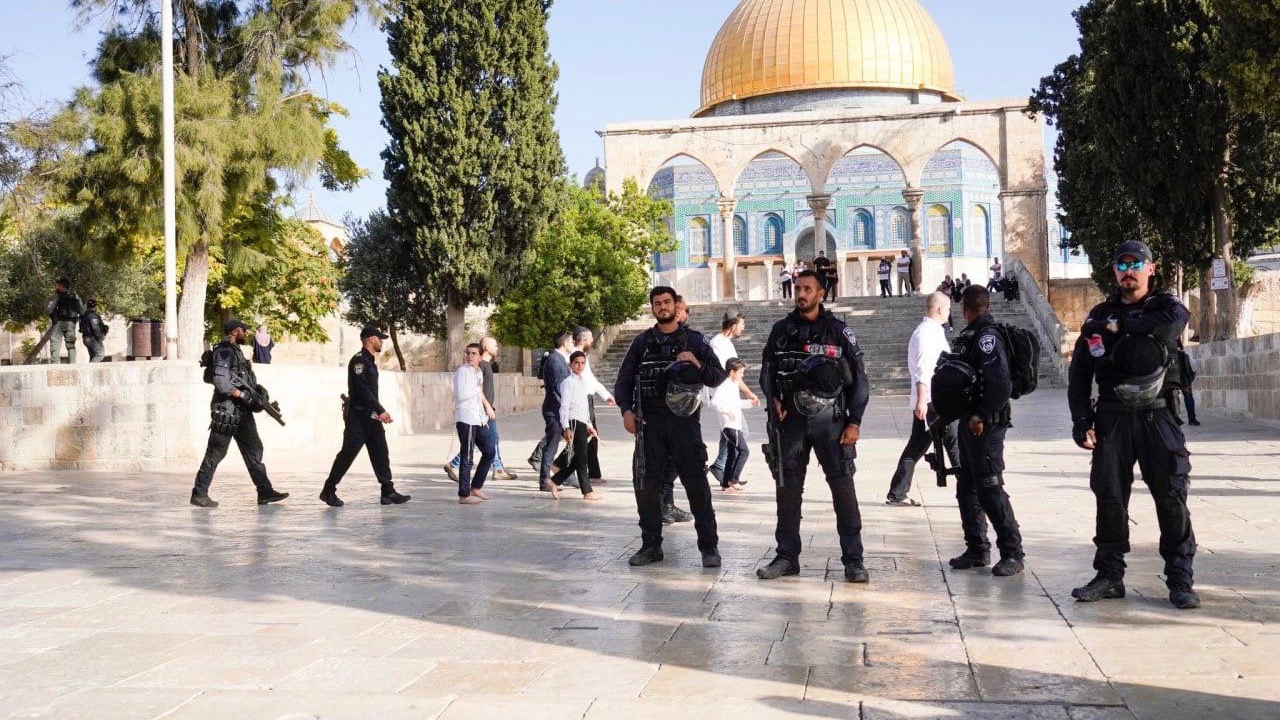On Tuesday, September 27, Israeli occupation forces stormed the Al-Aqsa mosque compound in occupied East Jerusalem for the third consecutive day. The occupation forces attacked Palestinians worshipers inside the mosque compound and allowed settlers to perform rituals prohibited by law.
Several Palestinians were wounded and over a dozen arrested in the attacks carried out by the occupation forces. The Israeli forces erected barricades all across the old city to prevent Palestinians from reaching the compound. As per the Quds News Network, for the last three days, Israeli forces only allowed Palestinians above the age of 40 to visit the mosque.
Quds News Network reported that at least 504 settlers stormed the Al-Aqsa compound on Monday and 446 stormed it on Tuesday.
On Monday, videos of Israeli forces pushing an elderly Palestinian on the stairs of the mosque compound went viral on social media. The elderly man, identified as Abu Bakr al-Shimy, was injured in the attack.
More disturbing footage of the Israeli force's attack on Palestinian Muslim worshippers inside Al Aqsa mosque. pic.twitter.com/KvXaYM2vKE
— Ramy Abdu| رامي عبده (@RamAbdu) September 26, 2022
Several other videos show Israeli forces storming the mosque compound and forcing Palestinians to leave the premises.
Israeli occupation forces assault Palestinian girls, elderly and young men near Bab Hutta to force them to leave after they were prevented from entering Al-Aqsa Mosque. pic.twitter.com/5RKbxhG2a7
— PALESTINE ONLINE 🇵🇸 (@OnlinePalEng) September 26, 2022
In some videos, Israelis are seen provocatively dancing and praying inside the premises.
To harass the Palestinians who were prevented from entering Al-Aqsa Mosque, lsraeli settlers perform provocative dances near the Chain Gate. It’s worthy of mentioning that about 300 settlers so far have broken into the Al-Aqsa Mosque courtyards under the protection of the IOF. pic.twitter.com/jgpQl8h14i
— TIMES OF GAZA (@Timesofgaza) September 27, 2022
Long bid to change status quo
Israeli forces often storm the Al-Aqsa compound under the pretext of security. They have also provided cover to extremist Jewish groups who have been campaigning for the demolition of the mosque in order to rebuild in its place what they call the Temple Mount, the holiest place in Judaism. According to a Times of Israel report, the number of Jews visiting the Al-Aqsa compound has increased manifold in recent years despite Palestinian objections.
The storming of the compound by extremist Jewish groups and Israeli security forces often leads to retaliation from the Palestinians, who consider Al-Aqsa a symbol of their resistance. A series of of similar attacks last year during the Islamic holy month of Ramadan had caused hundreds of Palestinian casualties. Over 400 Palestinians were also arrested during that period.
The latest round of attacks on Al-Aqsa coincide with the 22th anniversary of the second intifada against Israeli occupation, which began in 2000, following former Israeli Prime Minister Ariel Sharon’s visit to the compound.
Today marks the 22nd anniversary of the break-out of Al-Aqsa Intifada, an uprising against the Israeli occupation, where about 4500 Palesetinians were killed.
22 years have passed and Israeli forces & settlers haven't stopped storming Al-Aqsa Mosque.. pic.twitter.com/yTQ5biEIGg
— PALESTINE ONLINE 🇵🇸 (@OnlinePalEng) September 28, 2022
Apart from Al-Aqsa, the Israeli occupation forces have also blocked Palestinian access to the Ibrahimi mosque in Hebron in the occupied West Bank on the occasion of the Jewish new year, Rosh Hashanah. Israeli security forces allegedly prevented Palestinians from praying inside the mosque but allowed settlers to perform their rituals on the premises.
Palestinian resistance group Hamas issued a statement on Tuesday calling the attacks inside the Al-Aqsa compound “acts of provocation.” It warned that “unrelenting violations could lead to an uncontrollable explosion and unleash the wrath of all Muslim nations.”
Several West Asian countries, as well as the Arab League, issued statements condemning Israel’s failure to curb the attacks on Al-Aqsa, and demanded that Israel fulfill its commitment to maintain the status quo at the site.
Israel signed a deal with Jordan following its occupation of East Jerusalem in 1967 to maintain the status quo at Al-Aqsa, which is claimed by both Jews and Muslims. According to the understanding, Israel maintains the outer security of the site while the management of the mosque compound is the responsibility of the Waqf. Jews are not allowed to pray inside the compound, but can visit the site as tourists.





